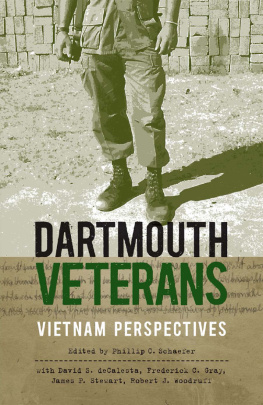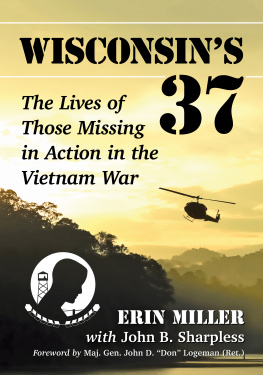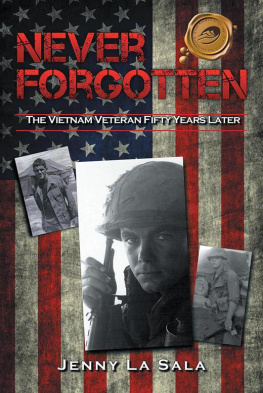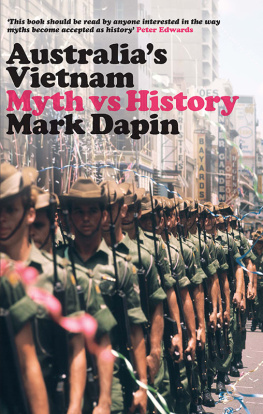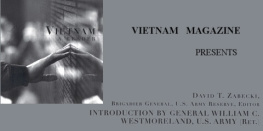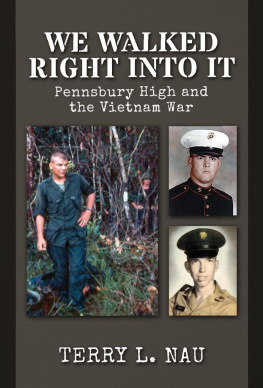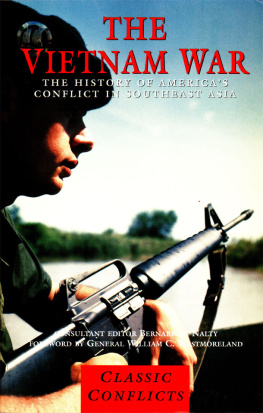Introduction
Time heals most wounds, but not all. The physical and mental scars sustained by many Americans in the Vietnam War remain to this day. When they returned from that unpopular war, they were generally shunned by their countrymen. They were called baby killers and confronted by protesters in airports and in the streets.
I grew up during that era. I remember the antimilitary attitudes. I remember the protests against the draft. I remember when a high school classmate, and fellow cadet in our Air Force Junior ROTC program, decided to join the Armys Rangers. I was saddened after he got killed during a night mission in Vietnam.
After graduating from high school in 1972, I attended Auburn University and graduated in 1976 with a bachelors degree in journalism. I was a news reporter for The Huntsville Times in Huntsville, Alabama, for four years before becoming a public affairs specialist at our Army post, Redstone Arsenal. I serve as editor of the installations weekly newspaper, the Redstone Rocket .
In January 2015, the Rocket began a series of articles on Vietnam veterans and Vietnam-era veterans as the United States commemorates fifty years since the Vietnam War. Our series continues to this day. In these articles, we share the life stories of true American heroes. They are extraordinary people who answered our nations call and did amazing things during a difficult time. Until now many of these men and women had not talked about their Vietnam experiences for fifty years.
This book shares their inspiring stories as these heroes finally receive the welcome home they deserved five decades ago.
Greg Arndt
Greg Arndt remembers getting off the bus at the Seattle-Tacoma Airport after returning from Vietnam.
Protesters behind a chain-link fence jeered him and his fellow Vietnam War veterans. This was his reception after serving a year in combat as a door gunner on a helicopter gunship.
Of course not everyone treated him that way. There was also the guy who bought him a beer in a bar.
Its much better today, Arndt said. When I came back, they kind of snuck us back into the country.
Arndt, 66, has plenty of time these days to reflect, sleep late, and enjoy sports. He retired in early January 2015 as an intelligence analyst from the Missile and Space Intelligence Center after forty-five years of service.
He was born July 18, 1948, in Womack Army Hospital at Fort Bragg, North Carolina, and grew up in an Army family.
He was the oldest of three sons of Albert and Grace Arndt. His dad was a Marine in World War II and an Army paratrooper with the 82nd Airborne Division after the war.
The family was later stationed in Germany. His dad went to electronics school at Fort Monmouth, New Jersey, and subsequently came to Redstone as an instructor. Arndt attended Lee High School, where he played football until breaking his arm, and he graduated in 1967. His family owned a pizza shop, where the boys learned the nuances of slinging pizzas.
With the draft looming, Arndt joined the Army in March 1969. He decided to get into aviation, helicopters, without telling his dad, who preferred a noncombat branch for the oldest son.
Id been with the military all my life, Arndt said. I just wanted to do something. Probably wasnt the smartest thing to do in the world, but I dont regret it.
He served in Vietnam, stationed in Chu Lai, from November 1969 to November 1970. He was in a combat unit that flew missions nearly every day, wherever and whenever needed. At twenty-one, he was one of the older guys.
We flew combat missions, so it was bad at times, the former specialist 5 said. At that time, Vietnam was going full bore. We lost a lot of ships, a lot of people. I went down twice, wounded. But getting shot down in a helicopter wasnt out of the ordinary. I mean, everybody got shot down at least once. I had some close calls.
There was the time an enemy rocket blew up beside his gunship, and he got hit by a piece of shrapnel. Another time, a .51-caliber machine gun round came up through the floorboard, beside his foot. The round severed the microphone cord, which was attached to his helmet, and missed his head by a matter of inches.
The first guy he met in the unit, a crew chief, was killed in the war. One crew got captured, and a few of those Soldiers spent five years in a prisoner of war camp. Arndt left the military after three years. He entered civil service at Redstone in early 1972 under a veterans hiring program. He earned a bachelors degree in math, with a minor in computer science, in 1979 from the University of Alabama in Huntsville.
His wife, Linda, died from cancer about four and a half years ago. Their son, Mike, 44, who was nine months old when Arndt returned from Vietnam, is a truck driver in Birmingham.
Since 1984, Arndt has served as an assistant coach for the boys soccer team at Grissom High School. The Tigers have won eight state championships (1992, 1994, 199699, 2000, and 2010).
His nephew Spc. Brandon Barbee, of the 82nd Airborne Division, returned to Fort Bragg from Afghanistan in early December 2014. The Decatur natives homecoming was much different than the one Uncle Greg received after Vietnam.
I think any kind of remembrance or accolades that vets can get is good, Arndt said. I mean, I just have a lot of support for them. Im patriotic. What can I say?
Mike Roddy
As a young captain, Mike Roddy had an unsettling first night in Vietnam in January 1970. He was kept awake by the horrible nightmares of Soldiers whod been in the war zone for multiple tours.
Im thinking, What have I gotten myself into? Roddy recalled.
But the two and a half years he spent in Vietnam proved to be personally fulfilling. Roddy decided to stay in the Army and retired as a colonel in 1996 after thirty years.
The thing that stands out in my mind [about Vietnam] is the quality of the people you were working with, he said, whether it was enlisted men when I as a company commander or senior officers when I was down at Long Binh. Everybody had a job to do, and they did it to the best of their ability.
Roddy, an Ordnance officer, served as commander of C Company, 704th Maintenance Battalion. Later he became a staff officer at the Armys headquarters in Long Binh.
He once delivered a briefing to a roomful of general officers that included Gen. William Westmoreland, chief of staff of the Army, on Westmorelands farewell retirement tour.
The mortar attacks from the enemy were constant. Occasionally these mortars would hit close by, Roddy said. He recalled that a young Soldier he worked with was killed.
During rest-and-relaxation trips, Roddy took advantage of the opportunity to see the world. He visited Hong Kong and Australia, among other places. And he had the chance to meet Soldiers with whom he would reunite later in his career.


